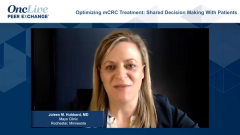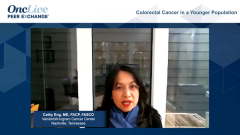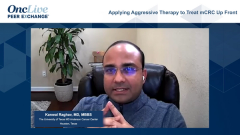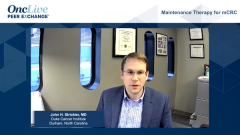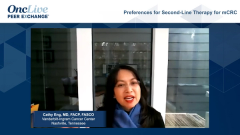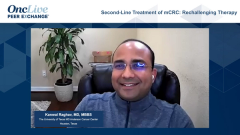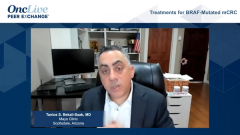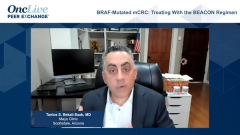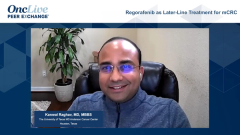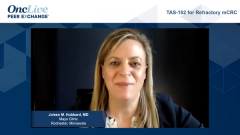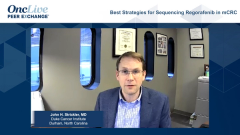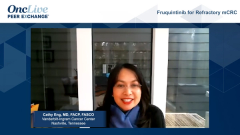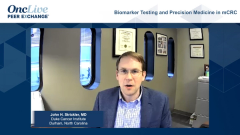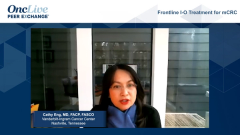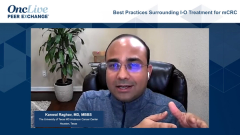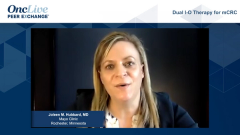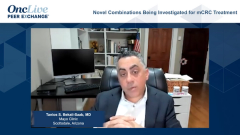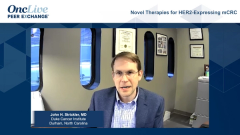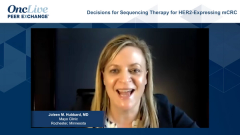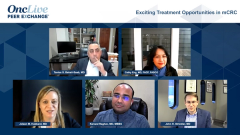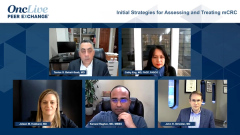
Exciting Treatment Opportunities in mCRC
Closing out a discussion on novel therapies used to individualize treatment for patients with metastatic colorectal cancer, a panel of gastrointestinal oncologists highlight the most exciting treatment opportunities being explored to address current gaps in care.
Episodes in this series

Tanios S. Bekaii-Saab, MD: This is certainly an interesting discussion; we'll see where all this evolves. The RAS mutations with HER2 amplification are problematic. They tend to typically predict for lack of response. We'll see how it does with the ADC [antibody-drug conjugate]. We didn't touch upon is, with the antibody-drug conjugates, there is a significant risk—small, but significant, for interstitial lung disease, which is one of the reasons why many advocate for the replacement, following dual inhibition. But we'll see where the data evolves. This was a fantastic discussion. What great colleagues and educators all of you are and researchers. Thanks to all of you for this rich and informative discussion. Before we conclude, I'd like to get final thoughts from each of you on exciting new developments and emerging agents. We're going to start with Dr. Eng.
Cathy Eng, MD, FACP, FASCO: I would obviously like to see more data on IO [immunotherapy] therapy for MSI [microsatellite instability] stable patients. Once again, encouraging enrollment into clinical trials. That's key here. I cannot say that enough. I'm excited about our Phase III trial as well, giving another opportunity for patients with FRESCO-2.
Tanios S. Bekaii-Saab, MD: Dr. Hubbard?
Joleen M. Hubbard, MD: I'm excited about some of the progress that's being made with targeting KRAS mutations. There are new trials out for KRAS G12C, G12D, but then, there's also the study that's being led out of Mayo Scottsdale, with onvansertib, which is FOLFIRI [folinic acid, fluorouracil, irinotecan hydrochloride], plus bevacizumab, plus onvansertib, in a second-line setting for patients with KRAS mutations. Onvansertib is a polo-like K1 inhibitor. There's a lot of promise for our patients. We've seen some interesting results in the first phase of the study, looking forward to seeing what we get with Phase II.
Tanios S. Bekaii-Saab, MD: Great. Looking forward to that. Dr. Raghav?
Kanwal Raghav, MD, MBBS: I'm most excited about ctDNA [circulating tumor DNA] applications in cancer in general, but in colon cancer particularly, both from detecting alterations and looking at the evolution. It allows us to act on acquired mutations or acquired amplification, which are resistant mechanisms. We couldn't have done with - - biopsies, feasibly. The application of ctDNA in the monitoring of disease, whether it is minimal residual disease, or some applications, in which case, we are trying to see if we can monitor the metastatic setting. Not making this judgment call, somebody needs to get FOLFOXIRI [folinic acid, 5-fluorouracil, oxaliplatin, irinotecan] or FOLFOX [folinic acid, fluorouracil, oxaliplatin] for 2 months before we figure out what's going on. Look at early responses and try to change the treatment.
Tanios S. Bekaii-Saab, MD: Great, Dr. Strickler?
John H. Strickler, MD: Thank you. Following up on the theme from Kanwal Raghav, excited about using circulating tumor DNA to identify patients appropriate for EGFR [epidermal growth factor] rechallenge. We can be looking out for interesting data over the next couple of years in this area, where we can increasingly use this important technology to give the right patients the right treatment at the right time.
Tanios S. Bekaii-Saab, MD: Great. Thank you again. To our viewing audience, we hope you found this OncLive Peer Exchange discussion to be useful and informative. Thank you again.
Transcript Edited for Clarity


